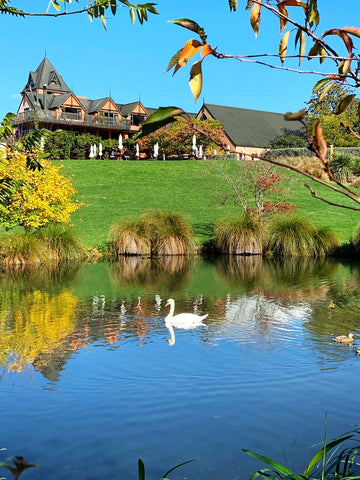
Rolling Leaves
Here is a curly question for you; who or what is a leaf roller? Some culinary dishes, such as dolmas, involve rolling rice inside grape leaves. In bygone days, people were employed in steamy factories rolling shredded tobacco inside tobacco leaves to make cigars. It has been said that most of the workers were young women who rolled the cigars on their thighs, but that is probably fanciful nonsense. The type of rolling that concerns us is the curling of parts of living leaves still attached to the plant. Most normal leaves have some degree of curvature but if it becomes extreme or deforms the leaf it’s probably due to a disease.
All plants can be affected by diseases, and grape growers need to regularly monitor their vines for signs of unease amongst the troops. But, what can a poor vine do to show its displeasure? There are a multitude of maladies that can affect plants but a limited number of ways they can show sickness. Most frequently, the signs appear in their foliage. Leaves may change colour, develop spots or streaks, form holes, dry out or deform in some way, such as by curling or rolling. Look around your garden and chances are you will spot the sort of thing we mean. Yes, plant diseases are that common.
Well, it’s all very fine to monitor but, you must be able to do something about it to make the effort worthwhile. Fortunately, we can and let’s take leaf rolling as an example. There are two main types that effect grapes and their causes and appearances are quite different.
The first is caused by a sneaky virus within the plant (Grapevine Leaf Roll Virus – GLRV). For most of the season this is undetectable except by DNA testing. In autumn, however, it strikes by making the leaves go prematurely red and irregularly curl at the margins. To the uninitiated, they look pretty but to the vigneron they are an ugly red flag. Leaves are meant to be green, which is caused by the chlorophyll within them, and its premature loss means that fruit ripening is markedly slowed and reduced; not a happy recipe for making fine wine. There is no cure and effected plants need to be replaced. This is a difficult decision when you have very old plants in a prestigious vineyard, as an autumn trip around Burgundy will show you. It’s no good making cuttings from these plants as the disease is transferred with them.
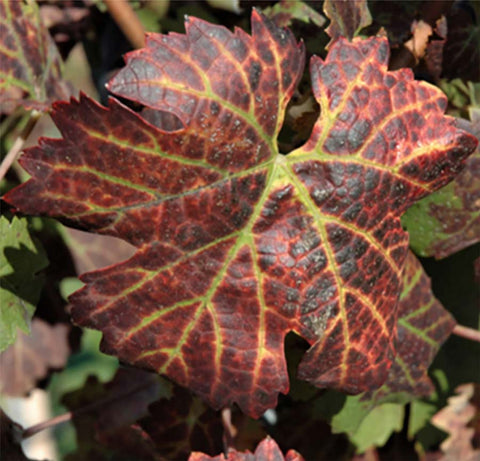
But how do healthy plants contract this nasty infection? It was long a mystery but is now known to be like the spread of infectious diseases in humans; by close contact, including intimacy, through wounds and via insect vectors. It’s not that one plant can give the virus to another just by rubbing shoulders, or rather branches, but out of sight their roots not only snuggle up close but can actually fuse and exchange fluid. It is also possible that the disease could be passed from one plant to another when making pruning cuts. It was commonly believed that these two were the only means of spread of GLRV until some clever Kiwis proved it could also be passed from one vine to another by a type of sucking insect, namely the mealy bug. These live in cracks and crevices in vines and tend to hide in the bark. They feast on many plants and you have probably got them lurking somewhere in your garden. Some spray insecticides against them with the adverse environmental risks this entails but, as they are impossible to eradicate, this would seem of limited use. An innovative approach is being tried in New Zealand and, although it might seem like firefighting with petrol, it just might work. It involves giving the bugs an easy ride by making their lives more comfortable. That is right, it turns out that mealy bugs love certain clovers and trials are underway to see if planting them between the rows will persuade the bugs to abandon their grapevine “towers” and feast in paradise on the earth. If it works, it will be a win-win. Our lives will be easier, while those measly bugs will be in clover!
An insect villain is also involved in the second type of leaf roll problem. It’s a moth, or rather it’s progeny. The adult is a rather insignificant little thing, mainly tawny, grey and brown. It lays its eggs on leaves and when the larvae have hatched they start munching, cutting leaf flaps that they roll around themselves and hold in place with a web, while merrily continuing to chomp. But these are only the outward sign of a deeper problem as the moth also lays its eggs in the centre of developing bunches of grapes. The resulting larvae not only eat some of the berries, but they surround themselves with their sticky web, which attracts and retains moisture, causing the bunch to rot. We deal with this by spraying the vines with natural bacteria that are toxic to the caterpillars only when ingested. In this way, we can target just those that are causing the problem, leaving the environment otherwise undisturbed and avoiding the use of chemical insecticides.
As mentioned, these are only a couple of the illnesses of vines, but they give you a glimpse into the fascinating and very varied world of plant pathology.
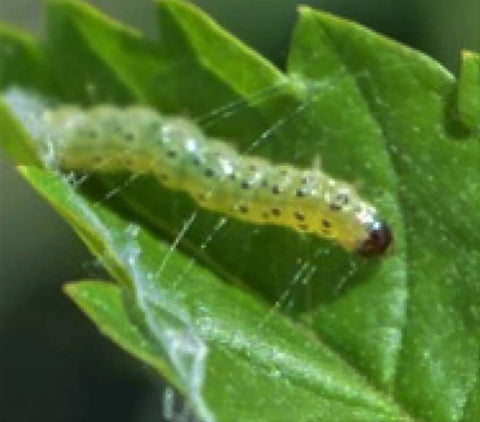
Pegasus Pinot Flies to the Top
Fifteen years ago, British wine writer, Matthew Jukes suggested New Zealand Pinot Noir was becoming so serious it deserved its
own classification, like Burgundy and Bordeaux. He teamed up with Australian wine writer Tyson Stelzer, to produce their first classification,
which came out in 2008. In the previous decade, the volume of Kiwi Pinot had exploded by 623%. In the decade since, however, it has grown by
only 7%, reflecting the sustainability and increasing maturity of the vineyards.
Matthew and Tyson have just released their Eighth Great New Zealand Pinot Noir Classification (2019) in which they reviewed New Zealand’s 512 Pinot makers. They ranked less than ¼ of them (121) as worthy of inclusion in their rating, in which 1 star is equivalent to a silver medal and 5 stars indicates consistent top gold-medal quality. This assessment is based on tasting at least the five most recent vintages (in some cases covered 16 vintages) of the winery’s standard estate Pinot Noir rather than reserve or special single vineyard bottles.
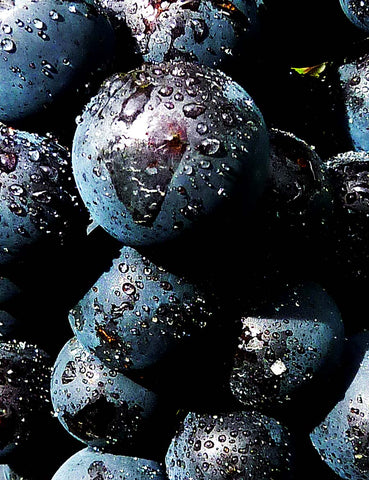
Pegasus Bay was proud to be included as a 5-star Pinot Noir producer along with only 6 others, who were Ata Rangi, Dry River, Bell Hill, Felton Road, Mount Difficulty and Rippon.
For further details see www.tysonstelzer.com/the-great-new-zealand-pinot-noir-classification-2019
Showing your Age
As your years tick by you will come to realise that there’s only one thing worse than reaching maturity, and that’s not making it! In the vinous world most bottles are consumed within 48 hours of purchase. For most of those wines it’s not a tragedy because they are made for early consumption and don’t really have much potential to improve with age.
However, Pegasus Bay wines are made to put away, which is why we tend to release them later than most wineries. We hold them back until we feel that they are ready to drink but it doesn’t mean that they won’t improve further with careful cellaring. We recognise that many of our customers don’t have storage facilities or simply can’t resist the temptation to drink our wines early. Accordingly, we stash away a small supply of selected bottles from each vintage and give you the opportunity to buy them as special aged releases after a decade in the bottle.
This year we are releasing the 2009 Pegasus Bay Riesling, Pegasus Bay Pinot Noir and Pegasus Bay Prima Donna. This was an excellent vintage (see under ‘The Seasons’ page 6)
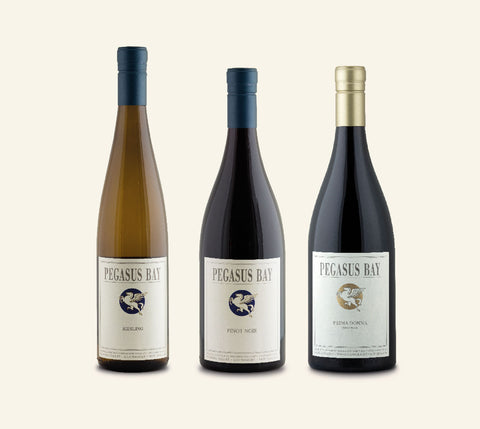
Some time back one, of the most influential internet wine sites in the world, www.wine-searcher.com, listed their 10 best value for money wines in the world and there was only a single New Zealand bottle that made the cut; a little old Pegasus Bay Riesling. The gurus that made the judgement clearly appreciated its ability to age but they didn’t try one that had been carefully cellared for 10 years.
Now is your opportunity to savour one (see our online shop).
The Restaurant Rests
The Pegasus Bay Restaurant has had many accolades, including being named top of its category by Cuisine Magazine annually on 10 occasions.
We think the restaurant has continued to improve and our last season has been one of our best. But our hard-working staff need a rest and will be on holiday between 8 July and 1 August inclusive. We will reopen on 2 August and will be rearing to go with the best of our food and service. During this break, the tasting room will remain open between 10 AM and 5 PM daily and we would be delighted to see you.
In the meantime, below is a special recipe from our head chef, Jackson Smith, to keep you happy.
Recipe
Pegasus Bay Pork, Prune and Pistachio Terrine
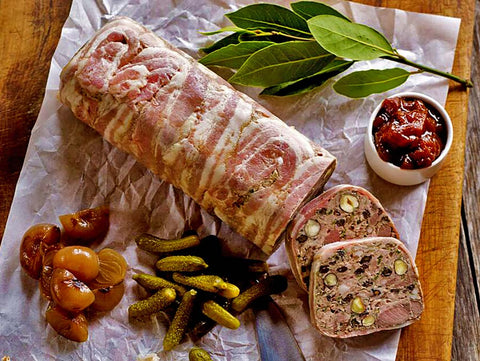
Ingredients
- 1kg pork shoulder, trimmed, diced, no skin
- Hand full thyme
- 6 bay leaves
- 1 brown onion, finely diced
- 3 cloves garlic, minced
- 1/4 cup chopped parsley
- 2 cups dry white wine
- 1/2 cup prunes, cut in quarters
- 1/2 cup pistachios
- 1 teaspoon cumin seed, fennel seed, coriander seed
- 2 tablespoon duck fat
- 10 slices Parma ham or streaky bacon
- 1 terrine mold with lid
Method
- Marinate pork shoulder in white wine, thyme and bay leaf overnight making sure all meat is completely submerged. The next day remove from wine and discard herbs and wine. Then coarsely mince pork.
- Sweat onions and garlic in duck fat until translucent, once cool add to pork mix.
- Toast seeds until aromatic, blend / crush to powder and add to mix.
- Add chopped parsley to mix
- Add prunes and pistachios, season generously with salt and pepper and mix well, using your hands. Check seasoning by cooking a little of the mix in a pan.
- Line terrine mold with cling film, leaving some overhanging to cover later. Then line the mold with Parma ham, leave 3 slices for the top of the terrine, fill the terrine mold with your mix and completely cover with the remaining ham. Cover with the overhanging cling film. Place on terrine lid.
- Preheat oven to 90˚C bake
- Bake in oven tray filled with water 3/4 the way up the mold for 2.5 hours.
- Cool in the mold over night before removing
- Enjoy with Pegasus Bay Pinot Noir!!
From the Prescription Pad
If you are an old fart like me, you might find computers a bit challenging. Should you earn your crust as a cruciverbalist, however, you have every reason to feel threatened by them. Yes, computers are as good, if not better than humans at producing crosswords and this applies to many other intellectual tasks as well.
“Hang on”, I can hear you say, “they may be capable of routine jobs but not those that require real thought. They’re not conscious. They don’t have feelings. They can’t experience human emotions, which form the basis of artistic genius.”
It is true that computers are unconscious, but they have been able to write poetry, produce essays and compose classical music that experts can’t distinguish from the real human thing. Computers are centre stage in the technological revolution that has taken over our lives. This is largely based on the concept that the world about us and, even within us, can be understood, mimicked and manipulated by scientific analysis and application of the resulting knowledge. One such area of growth has been that of molecular biology and it has allowed us to understand what makes us and other living things “tick”. It is largely based on analysing nature’s functions by breaking them down into tiny parts or so-called algorithms, which are really recipes for how nature works. There may be hundreds, if not thousands, of such algorithms involved in quite apparently simple actions, such as a muscle twitching. Understanding them gives us the chance to fix the process if it is faulty and computers can aid in this.
By such analysis, we have been able to unravel the mysteries of our genetic structure and the way this varies in inherited disorders, both human and animal. It has allowed us to understand many other diseases and to formulate treatments and cures. As a result, we are living longer and are healthier than our forebears. Nowadays, it’s uncommon for children in Western societies to die from infectious diseases but it is not long ago that a third of our babies didn’t make it to adult life. However, such advances are not without their problems and have contributed to the world’s burgeoning population. The world is over-populated and unless we do something about it, growing numbers will die of starvation. More food is needed, but most available farmland is already in production and chopping down forests to make room for more farms doesn’t seem to make a lot of ecological sense. Hence, the push for more effective farming and, in particular, new plants: disease resistant plants that grow more food faster; foods that taste better and, by definition, plants that are genetically different. You can’t create such new plants without their genetic structures being different from existing ones. How you do it, is a matter of debate but, however it is done, science has a major role play.
The genetic structure of living things changes with breeding but, as we all know, kids aren’t necessarily better than their parents and it’s the same with plants. To naturally breed a new strain of plant involves crossing the parents, then growing their seeds and subsequently evaluating the food that the new plants produce. It can be an enormously time-consuming, labour-intensive task and for every significantly improved strain there will be many, many rejects. Science can help with such projects by identifying early on those that have genetic structures that are likely to make them winners. Then, there is the possibility of modifying the genetic structure in the laboratory by genetic engineering or gene editing. It is not my intention to get into this minefield!
But humans are omnivores and since the agricultural revolution most of their meat comes from farms. Those with an eye to the future, however, suggest most meat will be grown in factories. In fact, meat is happily growing in laboratories right now and it’s only a matter of time until it could become large-scale. The recipes or algorithms for all the vital steps for growing meat have been discovered. We need to provide the building blocks, of course, proteins, carbohydrates and fats, but these can be derived from plants, as evidenced by the fact that farmed animals are herbivores. The promoters of such systems, let’s call them “future eaters”, say meat production will be more efficient, effective and cheaper: just what’s needed to feed the masses. Farms will be left to do what they do best, grow grass or other vegetation, without it being covered by cow pats and ground into the dust.
There may be nothing artificial about the future eaters’ steak because it could be “real meat”, grown from living muscle, the cells of which might be the children of a distant ancestor that once came from a real animal, perhaps 100 years earlier. The animal will have become immortal, or rather its muscles will have. The same could apply to many other species, be they beasts of the air, sea or land.
I mentioned this possibility to a vegetarian friend over a meal, but he thought he would remain faithful to the cause because, however distant, the meat had once come from a slaughtered animal. I respected him for that. When I raised the possibility of “virtual meat” he showed more interest but didn’t commit himself. When you can make cells grow and multiply they do most of the work for you. They create the meat with all its texture and structure. But, because the chemical algorithms to make meat are known, these could be used without living cells to produce something identical to the real thing, virtual meat.
Well, what’s all this got to do with wine? Quite a lot, as it turns out, because there aren’t only future eaters out there, but “future drinkers”. That’s right, people who believe the wine of the future will be made without grapes. A USA firm, Endless West, produces synthetic whiskey and now it has turned its hand to wine. It argues that such beverages mainly consist of water, alcohols, sugars, proteins, acids and volatile organic compounds. The contents of any bottle of wine can be analysed in a laboratory and the wine reproduced in factories. Endless West argues that this consumes less water than growing grapes and making wine, produces less CO2, uses no pesticides or fungicides and leaves vineyard land free for other purposes. Instead of taking years to get a grapevine into full production, toiling amongst the vines throughout the year and then getting one brief shot at a vintage annually, they can manufacture their “virtual wine” in less than a day and can even make it look like an old one. How old would you like it “virtually cellared”? Ten, 20 years or even older? You choose, we know all the algorithms. The process is free of those nasty natural risks of weather and viticulture, can make an absolutely constant product to order and one that is much cheaper than the real thing.
So, will the advent of virtual wine mean the death of the wine industry? The future drinkers that sit in boardrooms, backed up by their accountants might like to think so but I don’t agree. Why? Because it’s wine without a soul. It doesn’t speak of fresh air, sunshine, dirt or place. It doesn’t tell you what it is, where it comes from, about the season or who made it. It’s anonymous and boringly clinical. This doesn’t mean it can’t have a place in the market as a flavoured alcoholic beverage, but it shouldn’t be called wine. The current legal definition of wine stipulates that it is the fermented product of grapes and I believe it should remain that way. As you are a wine lover, I‘m sure you will agree.
Cheers,

The Seasons
Growing conditions for the 2009 vintage were amongst our best and we have been delighted with the way both the reds and whites have matured. A mild spring, a warm summer and a long lingering autumn created a perfect prelude to the 2013 vintage, which went off without a hitch. Autumn rain in 2014 resulted in some noble botrytis, benefiting rieslings, including Bel Canto. Spring frost reduced the crop of the 2015 vintage, but the rest of the growing season was excellent and the resulting wines are well balanced with good concentration. A perfect summer and a warm dry autumn in 2016 enabled us to pick each variety at the optimum time and it has been an exceptional vintage for both reds and whites. Autumn rain in 2017 caused us to pick a little earlier than usual but naturally small berries and good physiological ripeness has given the wines extra concentration, vibrancy and poise.
Current Vintages / Releases
All bottles 750ml unless otherwise stated
PEGASUS BAY RIESLING 2016
750 ml and Magnum 1.5 lt
Like classic wine producing regions, such as Germany and Alsace, we take our rieslings seriously. Pegasus Bay Riesling has been awarded super classic status by Michael Cooper in his book Classic Wines of New Zealand and this 2016 shows why. It is made in the off-dry style.
18.5+/20 North Canterbury is one of the world's great Riesling regions and to call this wine "iconic" is wildly understated.
Joelle Thomson, Drinksbiz Magazine NZ
5 stars 95/100 Irresistibly delicious ... sumptuous palate ... Mouth filling and lavish ... balanced and harmonious ... Terrific depth.
Sam Kim, www.wineorbit.co.nz NZ
93/100 Ripe lime and lemon ... flinty, sotny ... long build of concentrated citrus and stone fruit flavours. Terrific depth.
Nick Stock, www.jamessuckling.com USA
PEGASUS BAY RIESLING 2009 - Special Aged Release
For details see "Showing Your Age"
5 stars Concentrated grapefruit and peach ... Spicy, honeyed, crisp acidity and musky perfume.
Michael Cooper, Winestate Magazine AUS
95/100 Best import. A very exotic style.
Huon Hooke, Sydney Morning Herald AUS
95/100 Gorgeous complexity ... Exotic spice over crunchy backbone of lime and lemon
Tyson Stelzer. Wine Taste Weekly AUS
PEGASUS BAY GEWÜRZTRAMINER 2016
As mentioned under ‘The Seasons’ this was an exceptional vintage. This wine is unashamedly made in the big boned Alsatian style.
96/100 Explodes with flavour and texture .... A fantastic wine!
Cameron Douglas, Master Sommelier, The Shout Magazine NZ
5 stars Very classy ... Beautifully perfumed ... Powerful ... Well spiced ... Full of personality ... Delicious.
Winestate Magazine AUS
5 stars 18.5+/20 Exotic tropical fruits, root ginger, Turkish delight… Rich, luscious, powerful… Medium dry.
Raymond Chan, raymondchanwinereviews.co.nz NZ
5 stars Powerful… Beautifully perfumed… Unusual complexity and harmony… Delicious.
Michael Cooper, michaelcooper.co.nz NZ
PEGASUS BAY SAUVIGNON SEMILLON 2017 - New Release
We have never released a straight sauvignon blanc wine - why? Because we prefer one that has more texture, mouth feel and complexity than sauvignon blanc can produce by itself. By blending in semillon that was fermented in seasoned barriques we follow the old Bordeaux tradition, aiming to soften the sauvignon's pungency that can sometimes be over-the-top. It takes longer to integrate and express itself than sinmple sauvignon blanc so we purposely delay its release. We are particularly pleased with this wine as we feel we have achieved that balance while still clearly retaining the sauvignon varietal character. As it is just being repelased with this newsletter we do not have any reviews but here are some cellar notes.
"Citrus blossum, lemon, gooseberry and passionfruit ... Hint of strcuk match complexity ... Good terxture and body with a crispness that emphasises the wine's mineral notes"PEGASUS BAY CHARDONNAY 2017
Pegasus Bay Chardonnays come from old low yielding vines that tend to produce a very concentrated wine. In the tradition of great white Burgundy, the juice is fermented in French puncheons by the grapes’ natural micro-organisms and aged on lees for 18 months. This had produced a flinty, gun-smoke complexity which adds a savoury element. We have used only a minority of new barrels to minimize any oak character and emphasize the power of the fruit.
96/100 Impressive, vibrant and flinty white peach, grapefruit ... ripe melon, grilled nuts. A great wine that is packed with interest.
Nick Stock, jamessuckling.com USA
95/100 Bold, complex and flavoursome ... struck match, mineral, grapefruit, bran biscuit and spicy oak ... A textural wine that feels as good as it tastes
Bob Campbell MW, www.bobcampbell.nz NZ
95/100 Superbly fruited ... with seductive flinty complexity ... concentration complemented by creamy mouth feel ... finishing extremely long and expansive
Sam Kim, www.wineorbit.co.nz NZ
PEGASUS BAY CHARDONNAY 2016
Magnum 1.5 lt
This was made in the same way as the 2017 Pegasus Bay Chardonnay mentioned above.
5 stars 19/20 Deep and densely packed core with a layer of mealy-nutty and flinty-mineral elements ... rich and luscious ... underlying power ... very long finish.
Raymond Chan, raymondchanwinereviews.co.nz NZ
5 stars 95/100 Fresh amd flavoursome ... Marmalade, apricot, peach, brioche and flinty mineral flavours ... Complex ... Great texture and very lengthy finish.
Bob Campbell MW. therealreview.com NZ
94/100 Struck matchwith intensity of fruit to cover. Excellent but you have to enjoy a walk on the wild side.
Gary Walsh, www.winefront.com.au AUS
PEGASUS BAY MUSCAT 2016
We have a tiny plot of muscat à petits grains, a variety that is used in Alsace and the Rhône Valley. It is used to make Muscat Beaumes de Venise wine in the latter region. This 2016 muscat has the intensity of Muscat Beaumes de Venise but is made in a drier style. As it is restricted to cellar door and mail order we usually don't many reviews but here are a couple.
92/100 Aromatic, fruity and enticing with abundance of flowers, white fleshed fruits and exotic perfume ... Fleshy, juicy, ripe and spicy ... satin and coarse silk textures.
Cameron Douglas, Master Sommelier,
camerondouglasms.com NZ
92/100 The ultimate aromatic grape variety with pure floral flavours... Impressive.
Bob Campbell MW, www.bobcampbell.nz NZ
PEGASUS BAY PINOT NOIR 2016
We use traditional Burgundian techniques to make our pinot noirs, including natural primary and secondary fermentations by indigenous micro-organisms. Primary fermentation is carried out in small vats that are gently plunged to avoid excessive extraction. This wine was then matured for 18 months in oak barriques from artisan Burgundian coopers. The reviews are just starting to come in but it is clear it is a big baby and will be a keeper.
5 stars 95/100 Dark fruit richness ... savoury undertones ... awesome power and concentration ... finishing persistent and engaging
Sam Kim, www.wineorbit.co.nz NZ
94/100 Wild herbs, bracken, red fruits ... dense, succulent and seamlessly polished. Long and taught. Needs time.
Nick Stock, jamessuckling.com USA
94/100 Bold, strong perfume, dark berries, earthiness, truffle, cedar and clove ...Strong personality and very good.
Gary Walsh, winefront.com AUS
PEGASUS BAY PINOT NOIR 2015
Magnum 1.5 lt
This Pinot, the 2013, the 2009 and the Prima Donna mentioned below were made in the same way as the 2016 above. The Magnumjs And Jeroboams have been held back before release because of the slower maturation in larger bottles.
96/100 Super vibrant ... Forest floor, toasted spices ... A core of pristine dark cherry ... Effortless depth that singles this out as a consistently great New Zealand Pinot Noir.
Nick Stock, jamessuckling.com USA
5 stars 19+/20 Beautifully elegant and harmonious, vibrant ... Dark red fruits ... Savoury plums, dark herbs and frangrant florals ... Long and sustained.
Raymond Chan, raymondchanwinereviews.co.nz NZ
5 stars Boldly aromatic in the darker fruited spectrum ... Blackberry, currant, plum, star anaise, liquorice ... Long and generous ... Plenty of potential.
Winestate Magazine AUS
PEGASUS BAY PINOT NOIR 2013
Jeroboam 3 lt
At a large tasting of New Zealand pinot noirs held by Decanter Magazine in London, it was one of only a handful that was rated as "outstanding". It has also been rated as the best New Zealand and Australian wine under $A80 (750ml) tasted during 2017 by Tyson Stelzer.
96/100 Focused red cherry ... Impeccably mineral ... Grand finish ...Masterfully crafted expression of an exceptional site.
Tyson Stelzer's Australian and New Zealand Wines of the year 2017. www.tysonstelzer.com AUS
95/100 Vibrant with floral nuances .... Suave structure and poise, showing layers and layers of intensity.
Philip Tuck MW, Decanter Magazine UK
5 stars 96/100 Silken textured wine ... Extraordinarily lingering finish demonstrating real power. Supremely elegant.
Bob Campbell MW, www.bobcampbell.nz NZ
PEGASUS BAY PINOT NOIR 2009 - Special Aged Release
For details see "Showing Your Age"
5 stars Big, rich intense and complex.
Bob Campbell MW, www.bobcampbell.nz NZ
5 stars Deep ripe plum, spice and nut flavours ... Excellent complexity and richness ... Powerful and savoury
Michael Cooper, Winestate Magazine AUS
18.5/20 Harmoniously interwoven richly flavoured wine with subtle power and extract.
Raymond Chan, raymondchanwinereviews.co.nz NZ
PEGASUS BAY MERLOT CABERNET 2016
750ml and Magnum 1.5 lt
We make this blend of traditional Bordeaux claret grapes in the Bordelaise manner with pump-over and aeration of juice during fermentation, followed by maturation in French oak barriques for 18 months. It was clarified by racking it off its natural yeast deposit on several occasions prior to bottling.
5 stars 18.5+/20 Concentrated ... Blackberries, blackcurrants, redcurrants,... spice. Refined ...vibrant
Raymond Chan, raymondchanwinereviews.co.nz NZ
5 stars Dark, weighty ... Complexity ... Concentrated ... Depth and harmony.
Michael Cooper, The Listener Magazine NZ
Outstanding. Dark fruits dance on the palate, filling every corner of the mouth. Sumptuous ... Amazingly long and delicious finish. You just don't wnat to put the glass down.
Mark Henderson, Otago Daily Times NZ
PEGASUS BAY MALBEC 2017
We only have a small patch of malbec and it normally is blended with our Merlot Cabernet but sometimes it deserves to be its own wine and this one shows why. We think it is the best we have made and you can be the judge. We don't have any reviews because the wine is not for general release but here are some of our cellar notes.
Generous aromas and flavours of black plums, cherries, cranberries, violets, vanilla and roast coffee beans ... mouth filling with ripe tannins that give structure and draw out the length.
VERGENCE WHITE 2016
At Pegasus Bay, we are always exploring new wine styles and our "Vergence" series gives you the opportunity to see what we are up to behine the scenes. They show the potential of variety and winemaking techniques when you think outside the square.
This Vergence white is a blended wine bases on semillon that has been fermented and aged for two years in previously seasoned barrels. Don't think Australian semillon here, this wine is its own beast.
5 stars 94/100 Impressively complex and fragrant ... Grapefruit, baked apple, golden peach and toasted nut characters with a hintg of gun smoke ... Wonderfully weighted delivering rich texture ... Finishing long and attractively savoury.
Sam Kim, www.wineorbit.co.nz NZ
4 stars 91/100 Flavoursome richly textured and quite complex. More savoury than fruity. I like it.
Bob Campbell MW, www.bobcampbell.nz NZ
Reserve Wines
All bottles 750ml unless otherwise stated
PEGASUS BAY BEL CANTO DRY RIESLING 2017 - New Release
Seven Masters of Wine and a Master Sommelier have nmaed Bel Canto as one of five rieslings that are New Zealand's finest. Bel Canto is possible to make only in certain years. The grapes have almost the same ripeness as that used for Aria, but it is fermented to dryness. Because of the low crop and some noble botrytis, this has extra concentration. It is drinking beautifully now but will cellar well.
5 stars 95/100 Gorgeous ... Richly fruited and fragrant, concentrated and generously flavoured ... Opulent and delectable.
Sam Kim, www.wineorbit.co.nz NZ
94/100 Bold, complex with peach, apricots, honey and citrus flavours ... Richly textured with a lingering finish.
Bob Campbell MW, www.bobcampbell.nz NZ
94/100 Powerful ... Structure is impeccably judged, reining in massive amounts of flavour perfectly.
Nick Stock, jamessuckling.com USA
PEGASUS BAY BEL CANTO DRY RIESLING 2014
Magnum 1.5 lt
Because of the vintage conditions this wine had more noble botrytis than the 2017 mentioned above.
5 stars 95/100 Complex with apricots, honey, spice, clove floral and citrus characters… Gives a nod in the direction of Alsace.
Bob Campbell MW, bobcampbell.nz NZ
19/20 Harmoniously intertwined flavours of ripe citrus fruits, marmalade, honey, musk and minerality. Smooth texture with considerable power and drive.
Raymond Chan, raymondchanwinereviews.co.nz NZ
5 stars Outstanding… Full-bodied white with all the richness and complexity of the great chardonnays… Deliciously long finish.
Joelle Thomson, Drinksbiz Magazine. NZ
Excellent. Distinctively different ... fasinatingly complex.
Mark Henderson, Otago Daily Times NZ
PEGASUS BAY ARIA LATE HARVEST RIESLING 2016
750 ml and Magnum 1.5 lt
Over the years, this late harvest riesling has been one of our most popular wines but is made only in special vintages and 2016 was definitely one of such (see under 'The Seasons'), in making this wine we hand-selected only bunches that had 30% or more of noble botrytis.
95/100 Alluring bouguet ... mandarin, lime flower and apple blossom ... intense ripe citrus and apple tart tartin. Long and delicious.
Cameron Douglas, Master Sommelier, The Shout Magazine NZ
Excellent/Outstanding Sumptuous, delightful complexity ... Bittersweet element and hints of almond provide lovely counterpoint ... Savoury elements create a lovely balance ... to ponder over.
Mark Henderson, Otago Daily Times NZ
PEGASUS BAY ENCORE NOBLE RIESLING 2016
375 ml
The seven MW's and one MS, mentioned above under Bel Canto 2017, include Encore as one of the five best NZ sweet wines. This riesling is in the style of an Alsatian Selection des Grains Nobles or German Trockenbeerenauslese. We can make it only in very special years and this is only the second vintage that we have produced since 2011. Late in the season we carefully hand selected only the most perfectly shrivelled botrytic fruit and the small amount of juice that we obtained was left to slowly ferment at a low temperature over the winter and spring.
5 stars 19+/20 Concentrated core of ripe exotic tropical fruits... deliciously rich, nearly unctuous... lingering finish.
Raymond Chan, www.raymondchanwinereviews.co.nz NZ
5 stars 96/100 Concentrated, luscious ... Bush honey, pineapple, ginger and ripe peach ... Very lengthy finish.
Bob Campbell MW, www.bobcampbell.nz NZ
96/100 Rich with pristine apricots and marmalade note balanced by bright acid ... Balance is superb and the finish lasts into next week. Wow!
Joe Czerwinski, www.robertparker.com USA
PEGASUS BAY FINALE (NOBLE SAUVIGNON SEMILLON) 2017 - New Release
375 ml
Finale is a barrel fermented wine in the style of Sauternes and is only made in special years and this is the first we have produced since 2014. We selected only the most beautifully noble botrytic sauvignon blanc and semillon berries to make this wine. The small amount of juice obtained was fermented by the grapes' natural yeasts in artisan French oak barriques and matured in these. As it is being released for the first time in this newsletter we do not have any reviews but here are some of our cellar tasting notes.
"Stone fruit, beeswax, pineapple and paasionfruit ... Hints of brioche, hazelnut marmalade and butterscotch ... Rich and unctuous but plenty of acid to ensure perfect balance."
PEGASUS BAY VIRTUOSO 2016
750 ml and Magnum 1.5 lt
This reserve wine was made in the same way as Pegasus Bay Chardonnay 2017 above but came from the barrels that we feel best represented our vineyard and the vintage. Virtuoso is made only in special years and 2016 was definitely one of these (see under 'The Seasons' and "Pegasus Bay 2016 Chardonnay'). This is a refined but more powerful version of that wine and is just starting to come together.
18.5/20 Toasty, dry, full-bodied ... Loads of weight and a lindering finish. What more could you ask for in a top-notch Chardonnay?
Joelle Thomson, Drinksbiz Magazine NZ
5 stars 95/100 Intense, rich, weighty, with peach, biscuit, hazelnut, struck flint. Deliciously drinkable now but should develop well.
Bob Campbell MW, www.therealreview.com NZ
Outstanding White peach, citrus, struck match and smoke ... Powerful, wonderful drive and energy. Density but impressive freshness and vibrancy.
Mark Henderson, Otago Daily Times NZ
PEGASUS BAY PRIMA DONNA 2015
750 ml and Magnum 1.5 lt
We only produce Prima Donna Pinot Noir in exceptional years. It was made in the same way as Pegasus Bay Pinot Noir 2016 mentioned above and Prima Donna 2012 below. Prima Donna is a blend of the barrels that we feel best reflect the vintage and our unique terroir. It mainly comes from our oldest, lowest cropping vines that are non-grafted.
97/100 Stunningly beautiful ... Complex with dark plum, vanilla, hazelnut and smoked game characters, sumptuous, rich texture and awesome power as well as elegance.
Sam Kim, www.wineorbit.co.nz NZ
96/100 Rich, concentrated, quite savoury ... Plum, dark berry, violets and spice ... Very complex ... Worth cellaring.
Bob Campbell MW, www.therealreview.com NZ
96/100 Grand, majestic and complex ... Expansive, entrancing style. Black and red cherries, plums, earthy notes, woody spices and a wealth of pot-pourri and forest floor complexity ... Long succulent tannins. Superb! Good aging potential.
Nick Stock, jamessuckling.com USA
PEGASUS BAY PRIMA DONNA 2012
Jeroboam 3 lt
Just the thing for a special occasion. This wine has matured beautifully and this is what leading UK wine writer Matthew Jukes has to say about it.
It is one of the greatest wines that I have ever seen from this country. Satiate your palate ... and cement this wine in your mind for all time.
www.mattherjukes.com UK
96/100 Deliciously rich dark cherry aromas and flavours amid silky, refined long-form tannins. A great wine, in every aspect.
Nick Stock, www.jamessuckling.com USA
5 stars 96/100 Deeply scented, intense, plum, dark cherry, berry, licorice, mixed spice.
Bob Campbell MW, www.bobcampbell.nz NZ
5 stars Savoury, ripe, rich, velvety tannins ... Complexity and harmony.
Michael Cooper, The Listener Magazine NZ
5 stars Exotic opulence ... So much power and flavour ... Immensely appealing luxurious style.
Winestate Magazine AUS
PEGASUS BAY PRIMA DONNA 2009 - Special Aged Release
For details see 'Showing Your Age'. Robert Geddes, Australian MW, included it in his Top 100 Wines tastined during 2013.
5 stars Finer than Central Otago. Savoury edge and a tighter core of silky fruit due to its fresh and lively acidity. Very well made and well worth it.
Australian Wine Vintages 2013
I asked Sebastian Papin, brand ambassador for champagne Billecart-Salmon in Asia/Pacific, who had just come back from a tour of New Zealand wine regions, which New Zealand Pinot Noir impressed him most, to which he replied emphatically "Pegasus Bay, this is Burgundian!"
Curtis Marsh, www.thewanderingpalate.com NZ
PEGASUS BAY MAESTRO 2015
As with Prima Donna, Maestro is prodced only in special years and this is the first we have produced since 2009. As usual, this one is a blend of the barrels of merlot, cabernet and malbec that we feel best reflect the vintage and our terrior.
5 stars 19/20 Bold, fulsome, succulent ... Blackberry and plum ... Plenty of tannin ... Elegant sustained finish.
Raymond Chan, raymondchanwinereviews.co.nz NZ
94/100 Dark red berry fruits, plums, blackberries, violets and brown spices ... Organic earthy quality, complex ... Tannins and a lot of structure ... Lengthy finish and still very youthful.
Cameron Douglas, Master Sommelier,
The Shout Magazine NZ
94/100 Inky red ... Impressive concentration and good weight ... Silken texture. A seductive combination.
Bob Campbell MW, www.bobcampbell.nz NZ
93/100 A superb midweight flavoursome red.
Nick Stock, jamessuckling.com USA
